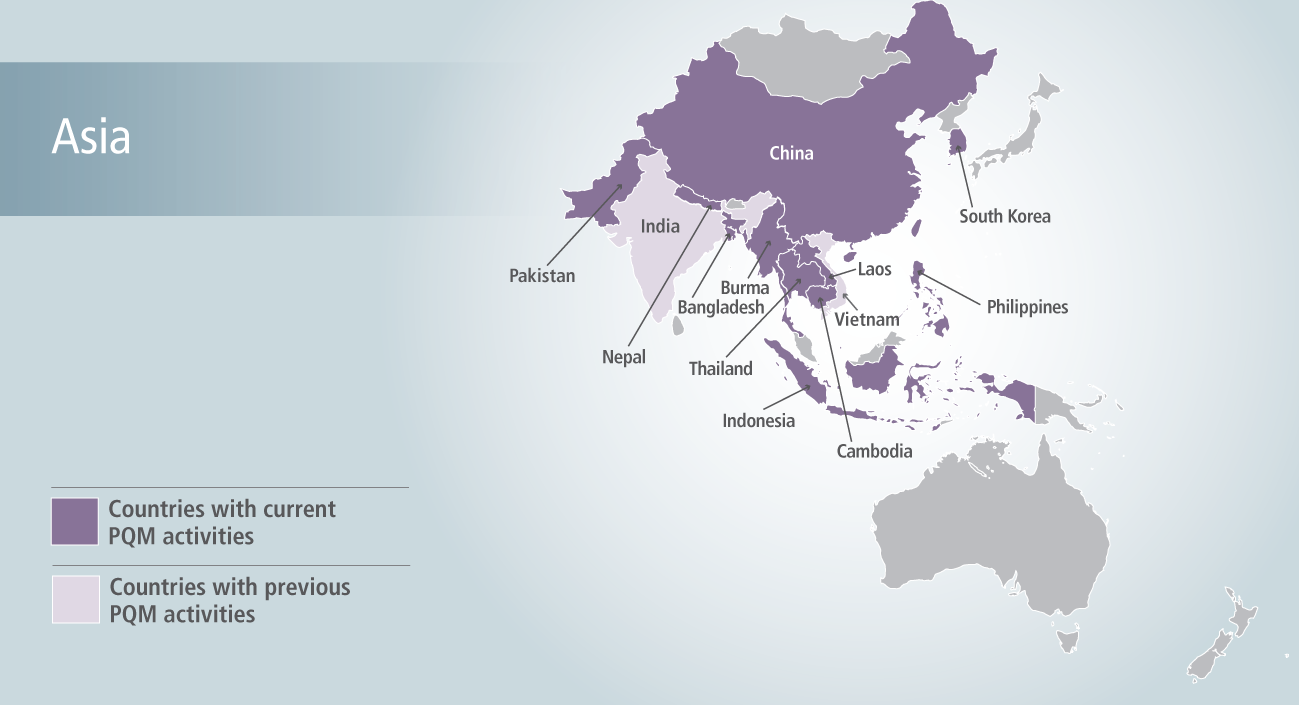
Promoting the Quality of Medicines (PQM) works with partners in Asia to help build robust pharmaceutical quality assurance systems. We have country offices in Indonesia and the Philippines, and support activities in 8 countries in the region.
Our Work in the Region
Strengthen National Regulatory Systems
- PQM supports the development of strong laboratory quality management systems in the region. With PQM’s support, national quality control laboratories in Vietnam and Thailand achieved WHO Prequalification status; the national quality control lab of Indonesia is expanding from product- to method-based testing in line with WHO requirements; national quality control labs in the Philippines, Burma (Myanmar), and Laos achieved ISO 17025 accreditation status.
- In Indonesia, PQM advocated and provided technical assistance to support the adoption of a new national regulation with stronger medicines quality assurance components; analytical trainings conducted at all 32 provincial and two national quality control labs; and helped secure additional and complementary donor funding for FY 2015 from the Global Fund to support testing of tuberculosis (TB) medicines at provincial quality control labs.
- In Thailand, PQM provided technical inputs to the Thai Ministry of Public Health to develop its National Malaria Elimination Strategy and accompanying operational plan.
- In Pakistan, PQM conducted trainings on good practices for pharmaceutical quality control and laboratory management. In Cambodia, PQM held workshops on ISO 17025 accreditation, WHO prequalification, and WHO good practices.
Increase Availability of Quality Medicines
- PQM’s collaborative efforts help countries increase the availability of quality-assured active pharmaceutical ingredients (APIs) and finished pharmaceutical products (FPPs), which is essential to sustaining steady supplies of essential health and medical commodities for combating malaria, tuberculosis, and other health challenges. Technical assistance PQM provided to manufacturers of anti-TB medicines in Asia has led to nine APIs and FPPs becoming WHO prequalified.
- PQM interventions made significant contributions toward increasing Good Manufacturing Practice (GMP). In Indonesia, local TB and HIV medicines manufacturers improved their GMP compliance and progressed toward WHO prequalification. In Pakistan, PQM has conducted assessments of two local manufacturers to support production and availability of quality-assured chlorhexidine gel to treat newborn umbilical cord infection, and PQM will provided continued support through technical assistance on product formulation, production, and registration.
Combat Falsified, Substandard, and Unapproved Medical Products
- Since the inception of the medicines quality monitoring (MQM) program in the Greater Mekong sub-region in 2003, surveillance activities have documented a decrease in product quality failure rates for antimalarials and other essential medicines. Data supplied by PQM-supported MQM programs have been used in regional police operations to close hundreds of pharmacies and illicit outlets in the region and helped develop targeted strategies to combat the manufacture and distribution of falsified and substandard medicines.
- In Indonesia, the Ministry of Health and the medicines regulatory authority have increased the types of samples included in the national post-marketing surveillance system (mainly TB, HIV, and other priority vertical program medicines)—through technical assistance from PQM and international donor programs to inject funding for joint activities and equipment.
- PQM provided technical assistance to redesign the post-marketing surveillance strategy in the Philippines in collaboration with the Department of Health, the National TB Program, medicines regulatory authority regional offices, and local government units toward sustainability and ownership.
Increase Evidence-Based Decision Making
- PQM initiated the Regional Expertise in Medicines Regulation, Information Sharing, Joint investigation and Enforcement (BREMERE) program to enhance timely information-sharing and cooperative action on the quality of suspected falsified and substandard medicines among regulators and partners in the region, and beyond, to facilitate enforcement actions.
- In Cambodia, PQM is supporting universities to improve academic programs on medicines regulation and quality assurance. More than 150 pharmacy students per year can benefit from the enhanced curriculum.
- PQM developed 11 training modules on regulatory inspection for staff at pharmaceutical distribution chains in USAID Regional Development Mission for Asia (RDMA) countries.
- As a result of PQM’s support and routine medicines quality monitoring, the Philippine medicines regulatory authority issued an advisory to healthcare professionals and the public warning them to avoid purchase and use of an illegal TB product; the Philippines FDA will be taking legal action against the manufacturer.
